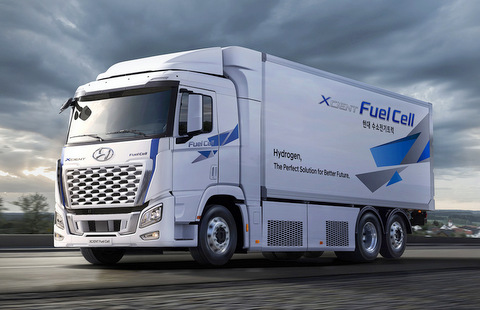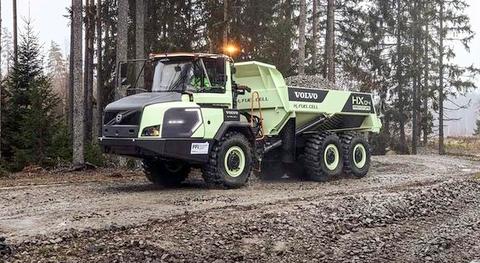The Future of Electrifying Heavy-Duty Machines
Fuel Cell Technology May Win Over Batteries
While consumer EVs have exploded in popularity over recent years, heavy equipment remains a challenge due to its power needs. Batteries pose a few key challenges alternative electric vehicle power sources could resolve.
The Challenges of Batteries
Electrifying heavy machinery and equipment—in addition to consumer vehicles—is essential to minimizing emissions. United Nations data shows the construction industry accounts for 37% of energy and process-related CO2 emissions. A large part of those emissions undoubtedly come from heavy equipment.

The main factor that will determine the future of electric heavy equipment is batteries. Heavy machinery and equipment require large amounts of power, often much more than a typical consumer vehicle would need. As a result, something like an electric dump truck would need a massive battery capacity to run on electricity.
On one hand, the price of EV batteries has been rising, likely due to increasing demand worldwide for battery materials such as lithium. The sheer size of the batteries necessary for heavy equipment could make them prohibitively expensive.
Additionally, charging such a large battery would take hours, which could hurt job site productivity levels. This poses a particular challenge for the rental equipment market. There are many benefits to renting heavy equipment, such as lower maintenance costs and more flexibility between projects. Lengthy charging times could make it too difficult to rent battery-powered equipment since a charger would be necessary on-site.
Fuel Cells: The Perfect Solution for Heavy Machinery?
There is an alternative to conventional EV batteries that could be the key to electrifying heavy equipment—fuel cells. The fuel cells are filled with clean fuel—often hydrogen—which powers a chemical reaction that creates electricity.

Unlike batteries, fuel cells don’t need recharging. They simply refuel with more hydrogen, much like a conventional gas-powered vehicle. However, hydrogen fuel cells don’t create harmful greenhouse gas emissions, unlike fossil fuel-powered equipment. Plus, they’re highly energy efficient, which could translate into lower fuel costs.
Fuel cells also dodge the expensive lithium battery supply chain, which could help keep the cost of electric heavy equipment down. Minimizing the cost of new tools is vital to ensuring high adoption rates.
Removing batteries from electric heavy equipment also improves the vehicles’ overall sustainability. The raw cobalt for lithium-ion batteries is notoriously sourced from unethical mining companies that have a harmful social and environmental impact in the Democratic Republic of the Congo.

Fuel cells aren’t just better for the environment—they are also more user-friendly. The convenience of refueling a hydrogen fuel cell compared to recharging a battery could give fuel cells a particular advantage in the heavy equipment market. Refilling a fuel cell takes minutes, just like a trip to the gas station. Hours-long charging times for battery-powered heavy equipment pale in comparison.
Numerous manufacturers are already developing battery-powered electric construction equipment, including a 26-ton excavator using a 300 kWh battery. Fuel cell technology is also advancing, particularly in large electric vehicles like semi trucks, where Volvo Trucks, Toyota/Hino, PACCAR, Daimler Trucks and Hyundai are both adding fuel cells to their electric truck lineups. As the heavy equipment and electric vehicle industries grapple with battery supply chain challenges, there will likely be more hydrogen fuel cell vehicles and machinery released in the years ahead.
Electrifying Heavy Machinery and Equipment
The future of electrifying heavy equipment and machinery is split between batteries and hydrogen fuel cells. Supply chain challenges in the battery market and the power demands of heavy equipment make it likely that fuel cells could be the key to electrifying heavy equipment.
More on Heavy-Duty Electrification
News: Has Nikola’s Founder’s Activities Changed the EV Conversation
How Long Until EV Fleets Take Over
News: Toyota Moves into the Big Truck Business
